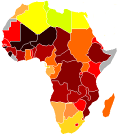Spliced feed for The Science Network |
| Social Science [SciScoop Science Blog] Posted: |
| Open Access in Africa [Sciencebase Science Blog] Posted: 24 Oct 2008 07:00 AM CDT
Conversely, there are those in the commercial world who ask, who will pay for OA endeavours and how can growth (current recession and credit crunch aside) continue in a capitalist, democratic society, without the opportunity to profit from one’s intellectual property. Those for and against weigh up both sides of the argument repeatedly. However, they often neglect one aspect of the concept of Open Access: how they might extend it to the developing nations, to what ends, and with what benefits. Writing in a forthcoming paper in the International Journal of Technology Management, Williams Nwagwu of the Africa Regional Center for Information Science (ARCIS) at the University of Ibadan, Nigeria and Allam Ahmed of the Science and Technology Policy Research (SPRU) at the University of Sussex, UK, suggest that developing countries, particularly those in Sub-Saharan Africa (SSA), are suffering from a scientific information famine. They say that beginning at the local level and networking nationally could help us realise the potential for two-way information traffic. The expectation that the internet would facilitate scientific information flow does not seem to be realisable, owing to the restrictive subscription fees of the high quality sources and the beleaguering inequity in the access and use of the internet and other Information and Communication Technology (ICT) resources. Nwagwu and Ahmed have assessed the possible impact the Open Access movement may have on addressing this inequity in SSA by removing the restrictions on accessing scientific knowledge. They highlight the opportunities and challenges but also demonstrate that there are often mismatches between what the “donor” countries and organisations might reasonably offer and what the SSA countries can actually implement. Moreover, they explain the slow uptake of Open Access in SSA as being related to the perception of the African scientists towards the movement and a lack of concern by policymakers. The researchers suggest that the creation of a digital democracy could prevent the widening information gap between the developed and the developing world. Without the free flow of information between nations, particularly in and out of Africa and other developing regions, there may be no true global economy. “Whatever might emerge as a global economy will be skewed in favour of the information-haves, leaving behind the rich resources of Africa and other regions, which are often regarded as information have-nots,” the researchers say. It is this notion that means that it is not only SSA that will lose out on the lack of information channels between the SSA and the developed world, but also those in the developed world. “The current From this perspective, they say, the free flow of scientific articles must be pursued by developing countries, particularly SSA, with vigour. “African countries should as a matter of priority adopt collaborative strategies with agencies and institutions in the developed countries where research infrastructures are better developed, and where the quest for access to scientific publication is on the increase.” They suggest that efforts could begin locally having found that even within single institutions in most African countries, access to scientific articles is very scant. “Local institutions should initiate local literature control services with the sole aim of making the content available to scientists,” they suggest. Proper networking of institutions across a country could then ease access to scientific publications. One such initiative in Nigeria has started under the National University Commission’s NUNet Project but wider support from governments is necessary to build the infrastructure. Research oriented institutions could use their funds to grant free access to their readers, especially given that many already pay subscription fees for their readers in large amounts. Williams E. Nwagwu, Allam Ahmed (2009). Building open access in Africa International Journal of Technology Management, 45 (1/2), 82-101 |
| Robots pump more iron with fuel-powered muscles [Earth & Sky Podcast] Posted: 24 Oct 2008 04:10 AM CDT Nanoscientist Ray Baughman is steering humanoid robots towards a power system that mimics our own human muscles and doesn’t need to be plugged in to recharge. This posting includes an audio/video/photo media file: Download Now |
| You are subscribed to email updates from The Science Network To stop receiving these emails, you may unsubscribe now. | Email Delivery powered by FeedBurner |
| Inbox too full? | |
| If you prefer to unsubscribe via postal mail, write to: The Science Network, c/o FeedBurner, 20 W Kinzie, 9th Floor, Chicago IL USA 60610 | |
 There is much talk about
There is much talk about
No comments:
Post a Comment